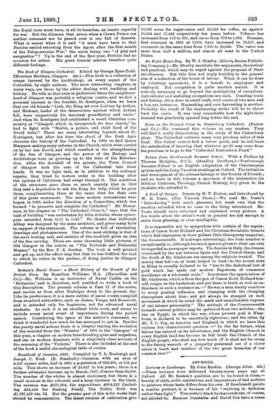A Book of Images. Drawn by H. T. Horton, and
Introduced by W. B. Yeats. (The Unicorn Press.)—We read Mr. Yeats's " Introducing " with much pleasure, but must own that the emotion subsided when we came to the thing introduced. Mr. Yeats should have criticised and explained every picture. A few words about the artist's work in general are not enough to make them pleasing, or even intelligible.
It is impossible not to sympathise with certain of the aspira- tions of Canon Scott Holland and his Christian-Socialistic friends which find expression in their gallant little threepenny magazine, the Commonwealth. It is always interesting ; the June number is exceptionally so, although too much space is given to what can only be regarded as newspaper reports. The famine in Italy, the dreams occasioned by the war between Spain and the United States, and the death of Mr. Gladstone are among the subjects treated. The misery that led—or, at least, helped to lead—to the recent riots in Milan is roundly declared to be "due to the diabolical lust of gold which has made our modern Napoleons of commerce murderers on a wholesale scale." Sometimes the appreciation of Mr. Gladstone, which is from the pen of Canon Scott Holland him- self, verges on the hysterical, and yet there is truth as well as en- thusiasm in such a sentence as,—" Ile was a man keenly sensitive to every passing influence, and changing with the changing atmosphere about him ; and yet always he stamped on each movement in which he acted tho mark and unmistakable impress of one intense personality." The attitude of the Commonwealth towards current politics may be gathered from two articles,—the one on Egypt, in which the war, whose present goal is Khar- toum, is declared to be essentially righteous; and the other, by Mr. T. C. Fry, on America and England, in which we have this curious but characteristic question :—" In the far future, when labour has entered on its inheritance, and the English Church in every English land has become in full truth the Church of the English people, who shall say how much of it shall not be owing to the fusing warmth of a sympathy generated out of a closer union in heart and intellect of the two great branches of our common race ?"






































 Previous page
Previous page